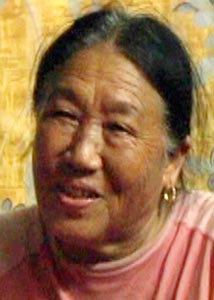Name: Ngodup Lhamo
(Alias: Yes)
Gender: Female
Interview Age: 66
Date of Birth: 1940
Birthplace: Gyashu, Kham, Tibet
Year Left Tibet: 1959
Profession: N/A
Monk/Nun: No
Political Prisoner: No

Interview No.: 88
Date: 2007-07-03
Language: Tibetan
Location: Lugsung Samdupling Settlement, Bylakuppe, Karnataka, India
Categories: Culture and History
Keywords: Bylakuppe -- early life in , childbirth, childhood memories, children's games, Chinese rule -- life under, escape experiences, festivals, Kham, myths/stories
Summary:
Ngodup Lhamo comes from Powo Yikong and belonged to a farming family. She recalls the problems faced by Tibetan women during childbirth. Since there were no hospitals or trained medical personnel, the majority of the births took place at home. Birth-related problems were viewed as the result of evil spells so rituals and prayers were performed to promote an easy birth.
Ngodup Lhamo also recalls fond memories of typical childhood games she played and discusses enjoyable festivals such as Losar 'Tibetan New Year' when her family drank home-brewed beer from silver bowls and told stories of ancient kings.
After the Chinese invasion, the Chinese began arresting people in Ngodup Lhamo's village, falsely accusing them of helping the Defend Tibet Volunteer Force. She, along with five other families, escaped through Pema Koe and reached Tuting in India. Although they faced many problems as refugees, gradually the settlements in India improved, just as His Holiness the Dalai Lama assured them when he visited Bylakuppe in the early days.
Interview Team:
- Rebecca Novick (Interviewer)
- Ronny Novick (Videographer)
- Tsering Dorjee (Interpreter)

